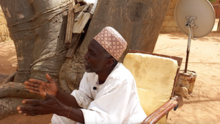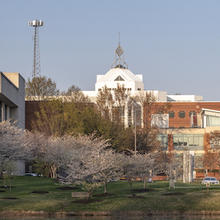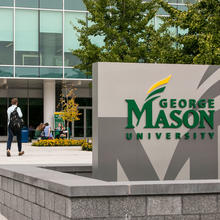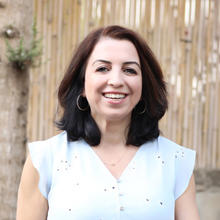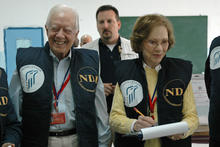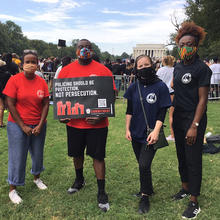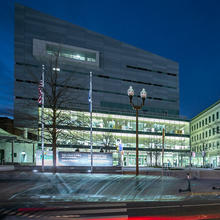Carter School News
- May 18, 2021Following decades of war and genocide in Sudan, in April 2019 a mass movement from civilians overthrew the dictatorship of Omar al-Bashir. As the country transitions to democratic rule, George Mason University’s Carter School for Peace and Conflict Resolution is working to empower civilians to use their voice to impact the future. The Mason team, working with partners in Sudan, has been interviewing and video recording oral histories of 100 Sudanese civilians who have lived through both war and peace. Their answers, which expand upon their experiences, also include their vision for a just Sudanese society.
- May 13, 2021The COVID-19 pandemic has made it so most museums are closed, but students and researchers at George Mason University’s John Mitchell, Jr. Program (JMJP) are working hard to create a digital one that sheds light on civil rights pioneers with largely untold stories. Thanks to an $8,000 grant from Virginia Humanities, the team is building a digital exhibit on the life of anti-lynching advocate John Mitchell, Jr., and his colleagues Frederick Douglass and Ida B. Wells. The grant is part of $181,500 in funding awarded to 25 nonprofits.
- May 13, 2021Graduating senior Nicole Herman said Mason made the world her campus.
- May 10, 2021In April, Natalia Kanos was elected Mason’s new student body president.
- December 11, 2020Of the more than 4,000 lynchings of Black Americans that took place in the United States between 1865 and 1950, at least 43 cases occurred in Maryland. George Mason University’s John Mitchell Jr. Program (JMJP), housed within the Carter School for Peace and Conflict Resolution, has been helping research several of these cases since 2019 to support the Maryland Lynching Truth and Reconciliation Commission. In October, they received news that they will be taking their research to the next level, thanks to a $300,000 Department of Justice grant they helped secure for the commission.
- October 13, 2020The Carter School has partnered with Restorative Arlington, a new initiative aimed at incorporating restorative justice practices into Arlington County’s public schools, legal system and community.
- September 23, 2020Fakhira Halloun holds two contradictory identities: She is Palestinian and an Israeli citizen. It wasn’t until she began facilitating peace dialogues between Israelis and Palestinians in Jerusalem in 2000, that she realized Palestinian citizens of Israel could be the missing link in bridging ties between the two groups.
- September 18, 2020A number of Carter School faculty and staff members are working closely with President Gregory Washington to make our university a national model for anti-racism and inclusive excellence.
- September 4, 2020What does social justice look like during a pandemic and a time of racial turmoil? George Mason University’s John Mitchell Jr. Program for History, Justice and Race (JMJP) has been busy answering that question.
- August 26, 2020Celine Apenteng may only have one biological sibling, but she regards nearly a dozen people from around the world as her sisters. This “extended family,” as she calls them, and Apenteng’s travels abroad, have had a profound impact on her view of education. “There’s always something for you to learn,” said Apenteng, whose family has hosted exchange students from France, Moldova and Germany since she was 10. “Even if it’s not something new, the way somebody says something could impact how you think about it.”
- July 8, 2020On July 1, 2020, George Mason University’s School for Conflict Analysis and Resolution opened the next chapter in its evolution from a center to a school when it officially became the Jimmy and Rosalynn Carter School for Peace and Conflict Resolution.
- July 1, 2020Dean Alpaslan Ozerdem addresses the adoption of our new identity as the Jimmy and Rosalynn Carter School for Peace and Conflict Resolution.

